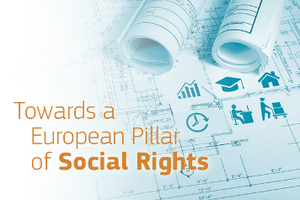The European Commission launched a public consultation on the European Pillar of Social Rights. COMECE welcomes this initiative and hopes that the proposed provisions may become a key reference document for the EU and the Member States in the field of economic and social affairs.

(Credit: European Commission)
The initiative shall build upon the EU social acquis and supports the Commission in its work for a deeper and fairer Economic and Monetary Union. The document when ready will not be legally binding in character, but become according to the Communication “a reference framework to screen the employment and social performance of participating Member States.”
COMECE welcomes the fact that the first preliminary outline that was announced with the consultation on Tuesday is already based on a broad understanding of social rights and not restricted to the limited competences of the EU in social policy. Particularly welcome are the proposed provisions on greater access to social housing and good quality health care. For COMECE the development of the EU’s social dimension is of great importance. As far back as 2012, the COMECE bishops issued Statement, on how the objective of competitive social market economy as envisioned by the EU treaties might be achieved.
COMECE intends participating with its Social Affairs Commission and together with its church partners in the consultation. It would welcome the fact that this pillar of social rights will feed-in as a reference document for future policies. Moreover, it is still necessary to clarify how the Commission intends linking the Pillar of Social Rights with the EU’s annual cycle of economic and fiscal policy coordination, the so-called European Semester, and the poverty targets outlined in the Europe 2020 Strategy. COMECE regrets that up until now the EU has limited itself to implementing the social pillar in the group of 19 Euro-states and merely invites the other member states to join the initiative.
The consultation will be concluded by December 2016 and specifically invites EU citizens to participate in the process.
